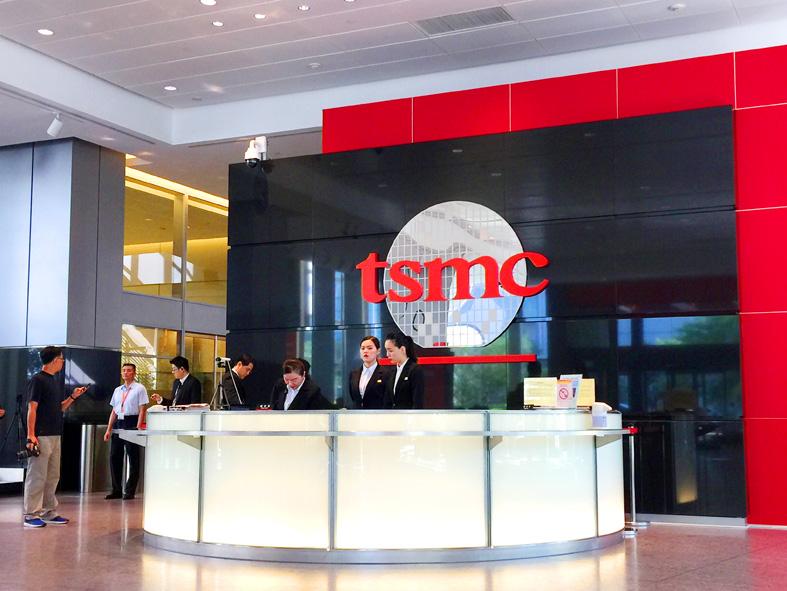To finance production expansions, Taiwan Semiconductor Manufacturing Co (TSMC, 台積電) would issue up to NT$120 billion (US$4.13 billion) in bonds, the company said on Friday.
The world’s largest contract chipmaker is to initially issue a batch of NT$21.1 billion in three unsecured corporate bond tranches: a five-year tranche of NT$4.8 billion with a coupon rate of 0.5 percent, a seven-year tranche of NT$11.4 billion with 0.55 percent and a 10-year tranche of NT$4.9 billion with 0.6 percent, TSMC said.
The plan, approved by a board meeting last month, would increase production capacity through new facilities and equipment upgrades, and pollution prevention measures at its fabs, it said.

Photo: Grace Hung, Taipei Times
Capital Securities Corp (群益證券) would serve as the lead underwriter of the bond sale, TSMC said.
In an investors’ conference held in mid-January, TSMC vice president and chief financial officer Wendell Huang (黃仁昭) said that the company would spend US$25 billion to US$28 billion on capital expenditure this year, a record for the chipmaker.
US-based advisory firm IC Insights said that governments in the US, EU and China would each have to spend at least US$30 billion per year for five years to catch up with TSMC and South Korea’s Samsung Electronics Co.
The combined capital expenditure of TSMC and Samsung is forecast to total at least US$55.5 billion this year, making it unlikely for any other chipmaker to rival them in spending, IC Insights said, adding that the two firms are expected to further widen their technology gaps with their competitors.
However, capacity shortages in the chip industry have over the past few months disrupted production at smartphone makers and automakers.
On Wednesday, Samsung said that its smartphone production in the second quarter could be affected by global chip shortages.
Seoul-based NH Investment and Securities Co said in a note on Thursday that the situation would start improving in the second half of this year, as operations at TSMC fabs in Taiwan and a Samsung fab in Austin, Texas, would return to normal, and new facilities of both companies would assume operations.

Sweeping policy changes under US Secretary of Health and Human Services Robert F. Kennedy Jr are having a chilling effect on vaccine makers as anti-vaccine rhetoric has turned into concrete changes in inoculation schedules and recommendations, investors and executives said. The administration of US President Donald Trump has in the past year upended vaccine recommendations, with the country last month ending its longstanding guidance that all children receive inoculations against flu, hepatitis A and other diseases. The unprecedented changes have led to diminished vaccine usage, hurt the investment case for some biotechs, and created a drag that would likely dent revenues and

Macronix International Co (旺宏), the world’s biggest NOR flash memory supplier, yesterday said it would spend NT$22 billion (US$699.1 million) on capacity expansion this year to increase its production of mid-to-low-density memory chips as the world’s major memorychip suppliers are phasing out the market. The company said its planned capital expenditures are about 11 times higher than the NT$1.8 billion it spent on new facilities and equipment last year. A majority of this year’s outlay would be allocated to step up capacity of multi-level cell (MLC) NAND flash memory chips, which are used in embedded multimedia cards (eMMC), a managed

CULPRITS: Factors that affected the slip included falling global crude oil prices, wait-and-see consumer attitudes due to US tariffs and a different Lunar New Year holiday schedule Taiwan’s retail sales ended a nine-year growth streak last year, slipping 0.2 percent from a year earlier as uncertainty over US tariff policies affected demand for durable goods, data released on Friday by the Ministry of Economic Affairs showed. Last year’s retail sales totaled NT$4.84 trillion (US$153.27 billion), down about NT$9.5 billion, or 0.2 percent, from 2024. Despite the decline, the figure was still the second-highest annual sales total on record. Ministry statistics department deputy head Chen Yu-fang (陳玉芳) said sales of cars, motorcycles and related products, which accounted for 17.4 percent of total retail rales last year, fell NT$68.1 billion, or

In the wake of strong global demand for AI applications, Taiwan’s export-oriented economy accelerated with the composite index of economic indicators flashing the first “red” light in December for one year, indicating the economy is in booming mode, the National Development Council (NDC) said yesterday. Moreover, the index of leading indicators, which gauges the potential state of the economy over the next six months, also moved higher in December amid growing optimism over the outlook, the NDC said. In December, the index of economic indicators rose one point from a month earlier to 38, at the lower end of the “red” light.